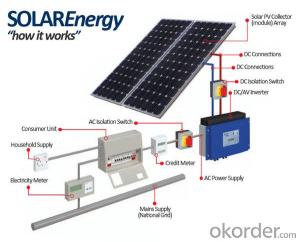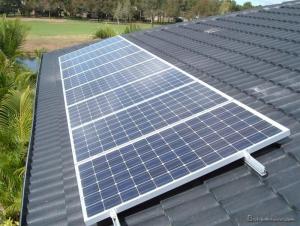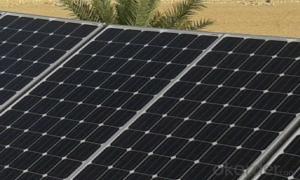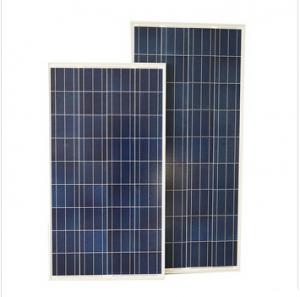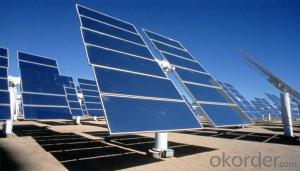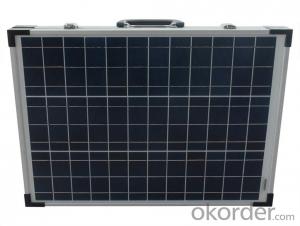Polycrystalline Solar Panels 45W With High Efficiency
- Loading Port:
- China main port
- Payment Terms:
- TT OR LC
- Min Order Qty:
- 100 watt
- Supply Capability:
- 1000000 watt/month
OKorder Service Pledge
OKorder Financial Service
You Might Also Like
Specification
Introduction of Poly solar panels CNBM
Polycrystalline Solar Panels 45W With High Efficiency
CNBM Solar photovoltaic (PV) Panel is designed for large electrical power requirements. It is the optimal choice for both on-grid and off-grid power systems. CNBM Solar panel offers high performance of power per square foot of solar array. Monocrystalline silicon(c-Si): often made using the Czochralski process. Single-crystal wafer cells tend to be expensive, and because they are cut from cylindrical ingots, do not completely cover a square solar cell module without a substantial waste of refined silicon. Hence most c-Si panels have uncovered gaps at the four corners of the cells.
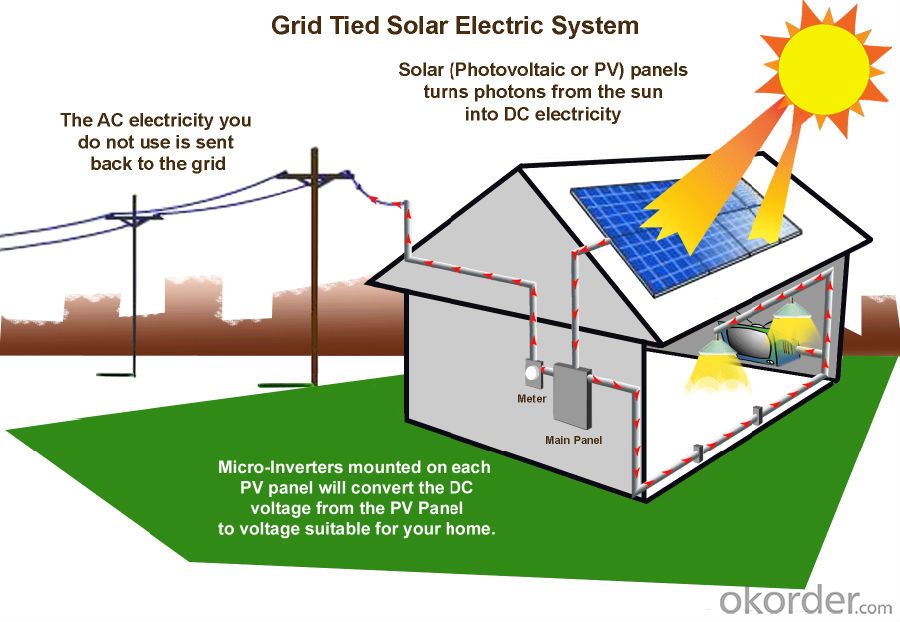
Feature
1.Solar Cell : High efficiency crystalline solar cell. Even if under the weak light, the solar module can produce maximum power output.
2.Tempered glass (toughened glass): Anti-reflecting coating and high transmission rate glass increase the power output and mechanical strength of solar module.
3.EVA and TPT: Using high quality EVA and TPT to prevent destroying and water.
4.Long lifetime: ≥25 years; Less power decrease.
5.Resisting moisture and etching effectively, not effected by geology.
6.The certificate issued by international authority: UL, TUV, IEC, VDE, CE.
Main Solar Panel Specification
Characteristics of Poly solar panels CNBM | |||||
Max Power Voltage Vmp(V) | 30.3 | 30.8 | 31.1 | 31.4 | 31.85 |
Max Power Current Imp(A) | 7.60 | 7.64 | 7.73 | 7.81 | 7.85 |
Open Circuit Voltage Voc(V) | 36.1 | 36.6 | 37 | 37.3 | 37.68 |
Short Circuit Current Isc(A) | 8.50 | 8.55 | 8.65 | 8.75 | 8.85 |
Max Power Pm(W) | 230W | 235W | 240W | 245W | 250W |
Temperature Coefficient of Cells Poly solar panels CNBM | |
NOCT | 45℃ ± 2℃ |
Temperature Coeffucients of Isc (%/℃) | 0.0492 |
Temperature Coeffucients of Voc (%/℃) | -0.3374 |
Temperature Coeffucients of Voc (%/℃) | -0.4677 |
Mechanical Data of Poly solar panels CNBM | |
Dimension | 1638 × 982 × 40 mm |
Weight | 19.5 kg |
No. of Cells and Connections | 60 (6 ×10) |
Tolerance | 0 ~ + 5 W |
Cell | Monocrystalline Cell 156 × 156 mm |
Packing | 624 Pcs/40ft(H) Container |
Limits of Poly solar panels CNBM | |
Operating Temperature | -40℃ to +85℃ |
Storage Temperature | -40℃ to +85℃ |
Max System Voltage | 1000VDC(IEC) / 600VDC(UL) |
Guarantees of Poly solar panels CNBM | |
Products Guarantee | 12 yrs free from defects in materials and workmanship |
Performance Guarantee | No less than 90% within 10yrs and no less than 80% within 25yrs |
Certificates | TUV(IEC61215&IEC61730),VDE(IEC61215&IEC61730),UL,CE |
Packaging Information
Package:26pcs/box
Quantity:1 box/pallent
Loading Capacity:952pcs/40ft
- Q: I am doing a report about solar power and I need to know what determines the amount of electricity produced?example: exposure to sun, angle of panel, qualityplease tell me as much as you canmuch appreciated
- It depends on what you mean by amount of electricity. Normally that would mean the total energy produced over a given period. In that case, the main factors are ) Efficiency of the solar cells 2) Total irradiation received: incident radiation density times the solar panel area, and the angle of the incident radiation. Item ) is determined by the materials and method of construction of the solar cells Item 2) depends on the location of the panel, both on earth's surface (latitude), time of year, and how the panel is oriented with respect to the horizontal. Altitude of the location can also be a factor. Prevailing weather conditions, number of cloudy days, etc. are important. Independent of these parameters, larger area means more electricity.
- Q: What is the impact of roof orientation on solar panels' performance?
- The impact of roof orientation on solar panels' performance is significant. The orientation of the roof determines the amount of sunlight the panels receive throughout the day, affecting their efficiency and energy output. Ideally, solar panels should be installed facing south to maximize exposure to sunlight. East and west-facing orientations can still generate energy but at reduced levels. North-facing roofs receive the least amount of sunlight and would result in the lowest solar panel performance.
- Q: hi,i have 4 solar panels. I can get 9V 400mA when i wired them parallel. The question is: how can i make a regulator circuit to store power into batteries.
- wire them in series parallel to get 8 volts at 200 mA, and that should charge a 2 volt battery. You may want to put in a series diode to prevent the battery from discharging into the panel when the sun is out. At 200 mA, depending on the battery size, you may not need much control, as that low a current will not overcharge a large battery, like a small auto battery. In fact it will take a very long time to charge it. edit: But do i need to add a regulator? If by that you mean a voltage regulator, no, as a solar panel has a high output resistance, and that will limit the current into the battery. If you mean a charge controller, if the battery is small, you may need a charge contoller to avoid overcharging the battery. But that is not a voltage regulator. .
- Q: What is the average lifespan of a solar panel?
- The average lifespan of a solar panel is typically around 25 to 30 years.
- Q: Can solar panels be installed on ground-mounted structures?
- Yes, solar panels can be installed on ground-mounted structures. Ground-mounted solar panel systems are commonly used when rooftops are not suitable for installation or when larger solar arrays are required.
- Q: How do solar panels affect home insurance rates?
- Solar panels can affect home insurance rates in a positive way. While the initial installation of solar panels may increase the replacement cost of the home, they can also reduce the overall risk of damage or loss due to their durability and ability to generate renewable energy. As a result, many insurance companies offer discounts or special coverage options for homes with solar panels, leading to potential savings on insurance premiums. However, it is recommended to consult with individual insurance providers to understand their specific policies and any potential impact on home insurance rates.
- Q: Can solar panels be installed on senior living facilities?
- Yes, solar panels can be installed on senior living facilities. In fact, many senior living facilities have started incorporating solar panels to reduce energy costs, promote sustainability, and provide clean energy solutions. Installing solar panels can help these facilities become more energy-efficient and reduce their carbon footprint. Additionally, solar energy can contribute to a more comfortable and sustainable living environment for senior residents.
- Q: Solar Panels not working very well, they have faded. Is there any paint or anything else I can do to restore them? Thanks Eileen
- Unfortunately Eileen the panels are bound to fade as its par for the course. Over time much like everything else (from an AC condenser to your knees and hips) everything starts to go south. When did you purchase and install your panels? If this was done within the past few years then something is definitely wrong, and you should have the manufacturer and installer come back and replace the panels....on their dime of course. Is the warranty on your panels still in effect? If so then its definitely something that they have to come back and take care of. There is a company I know of called Sun Electronics that has a 20 year warranty on their products, so if its worth anything you might want to buy your new panels/system from them. The panels around today are more efficient than those of years past, and with the cost coming down due to economies of scale and the tax incentives you might want to consider getting a new system. Sorry to let you down though Eileen!
- Q: And how do you choose the best one for the best price?I saw a 400 watt monocrystalline solar panel
- The polycrystalline solar panel has a longer life-span and has a higher efficiency. What this means is that from the energy that 'hits' the solar panel, more is caught and used to convert into electrical energy. A polycrystalline solar panel will have an efficiency of about 4%. The monocrystalline solar panel has a similar efficiency but the cells are prone to sunlight, so the efficiency drops over the years.
Send your message to us
Polycrystalline Solar Panels 45W With High Efficiency
- Loading Port:
- China main port
- Payment Terms:
- TT OR LC
- Min Order Qty:
- 100 watt
- Supply Capability:
- 1000000 watt/month
OKorder Service Pledge
OKorder Financial Service
Similar products
Hot products
Hot Searches
Related keywords
